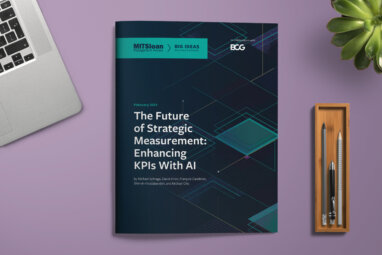
Executing Strategy
The Future of Strategic Measurement: Enhancing KPIs With AI
Smart organizations need smarter KPIs. This report outlines how leaders can create and capture value from smart KPIs.


Smart organizations need smarter KPIs. This report outlines how leaders can create and capture value from smart KPIs.

The summer 2023 issue of MIT Sloan Management Review examines risk, disruption, AI, finance strategy, and equity.

Algorithms sometimes fail to keep pace with changes in the environment and deliver poor-quality predictions as a result.

The delegation of managerial functions to algorithms transforms management practices.

It’s impossible to abolish AI bias in the data behind artificial intelligence models, but companies can remediate it.

This issue of MIT SMR focuses on creating and managing successful, engaged teams in a pandemic-changed world.

Building responsible AI systems starts with recognizing that technology solutions implicitly prioritize efficiency.

Sowmya Gottipati shares how Estée Lauder uses AI to learn about customers and make better product recommendations.

Managers’ intuition about how customers will feel about decisions made by algorithms rather than humans is often wrong.

When we rely on machines to make decisions, we substitute data-driven calculations for human judgment.

Kartik Hosanagar’s AI-powered startup aims to help new voices find their way into film and TV.

Companies adopting the best practices of responsible AI extract benefits while mitigating AI’s risks.

The pandemic’s impact on business strategy, digital superpowers to thrive through disruption, and “explicit uncertainty” to avoid algorithmic harm.

To address algorithms’ potential harm, companies must be willing to focus on users and rethink their business models.

Home Depot’s Huiming Qu discusses how the home improvement retailer leverages AI to improve the customer experience.

Will Grannis of Google Cloud explains the organization’s collaborative approach to AI and machine learning innovation.

Lyft’s Craig Martell talks education, eliminating bias, and cross-functional collaboration on machine learning projects.

Business — and society — should think of the governance of AI as an enabler rather than a constraint.

The “sharing economy” has fallen short of its promise to workers. A new book proposes a better way.

Ask these four questions to determine whether your AI system is really an AI solution.